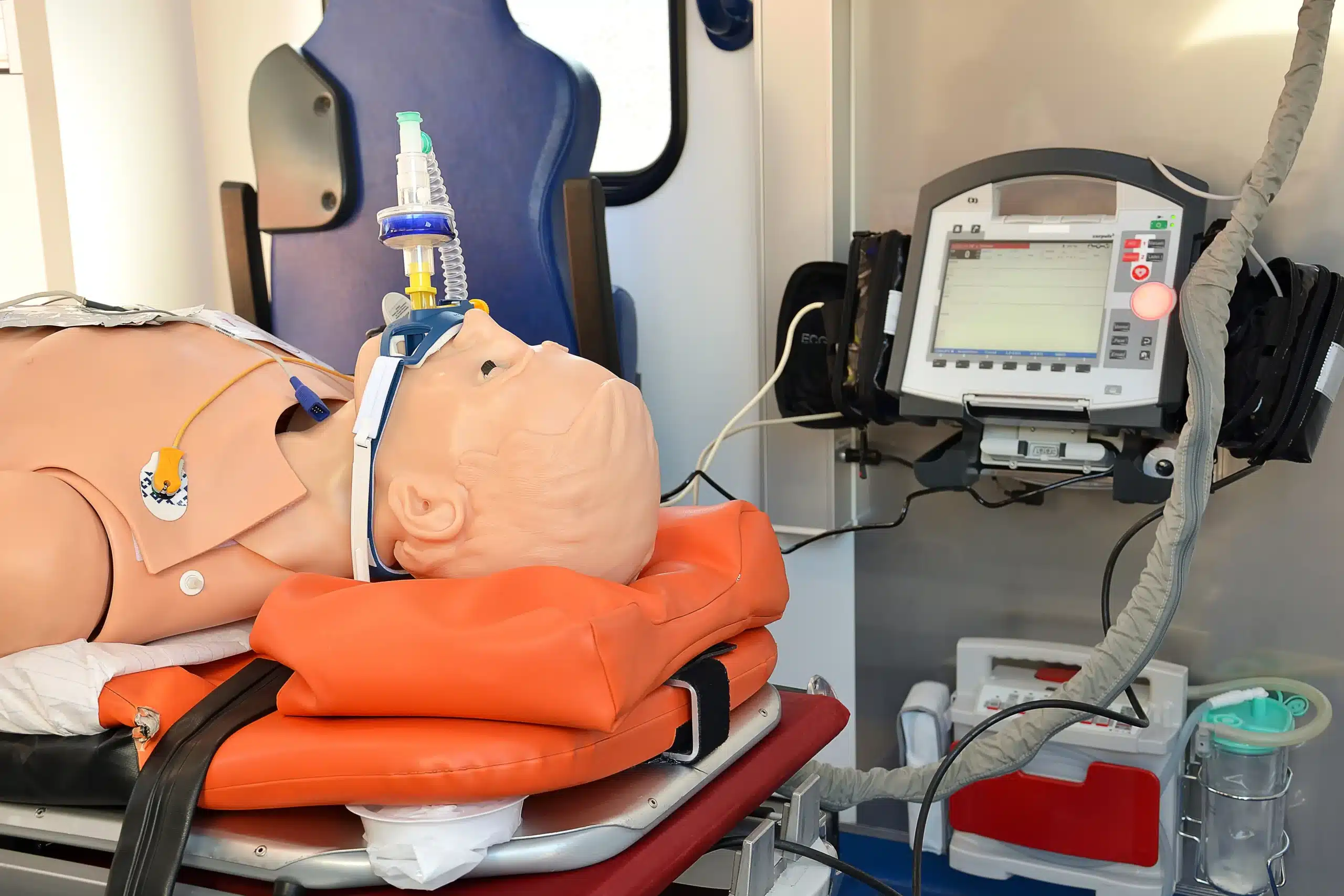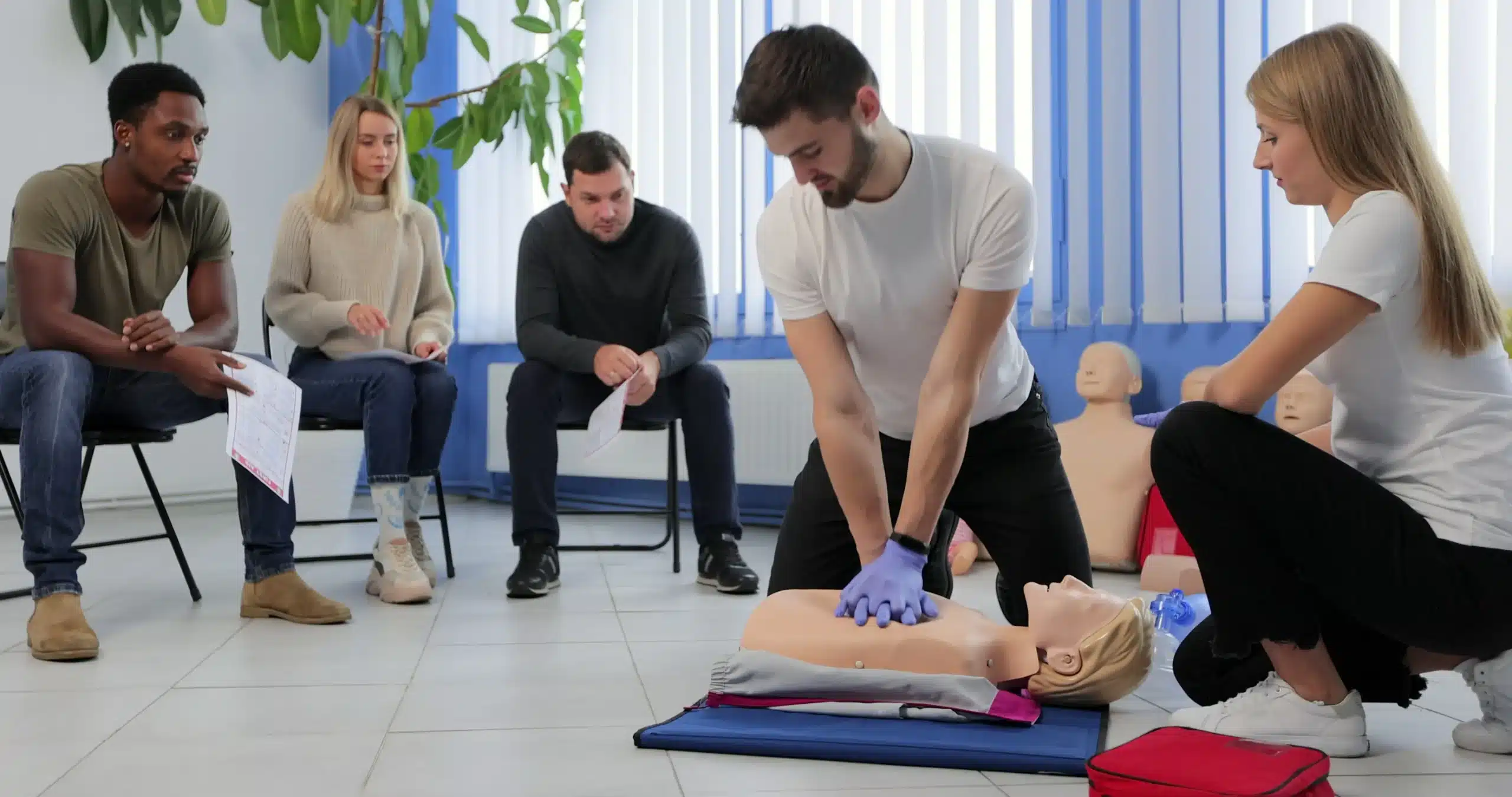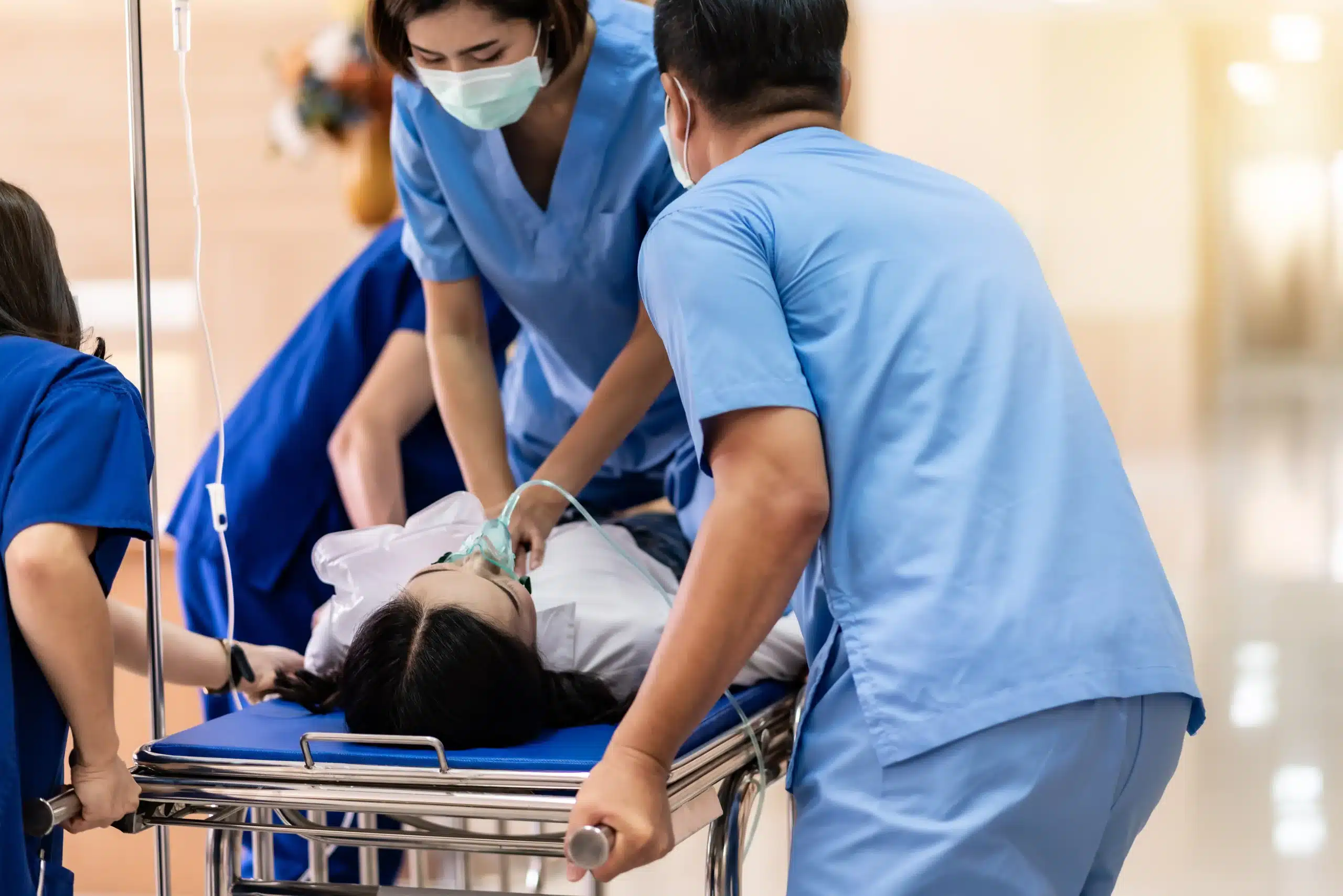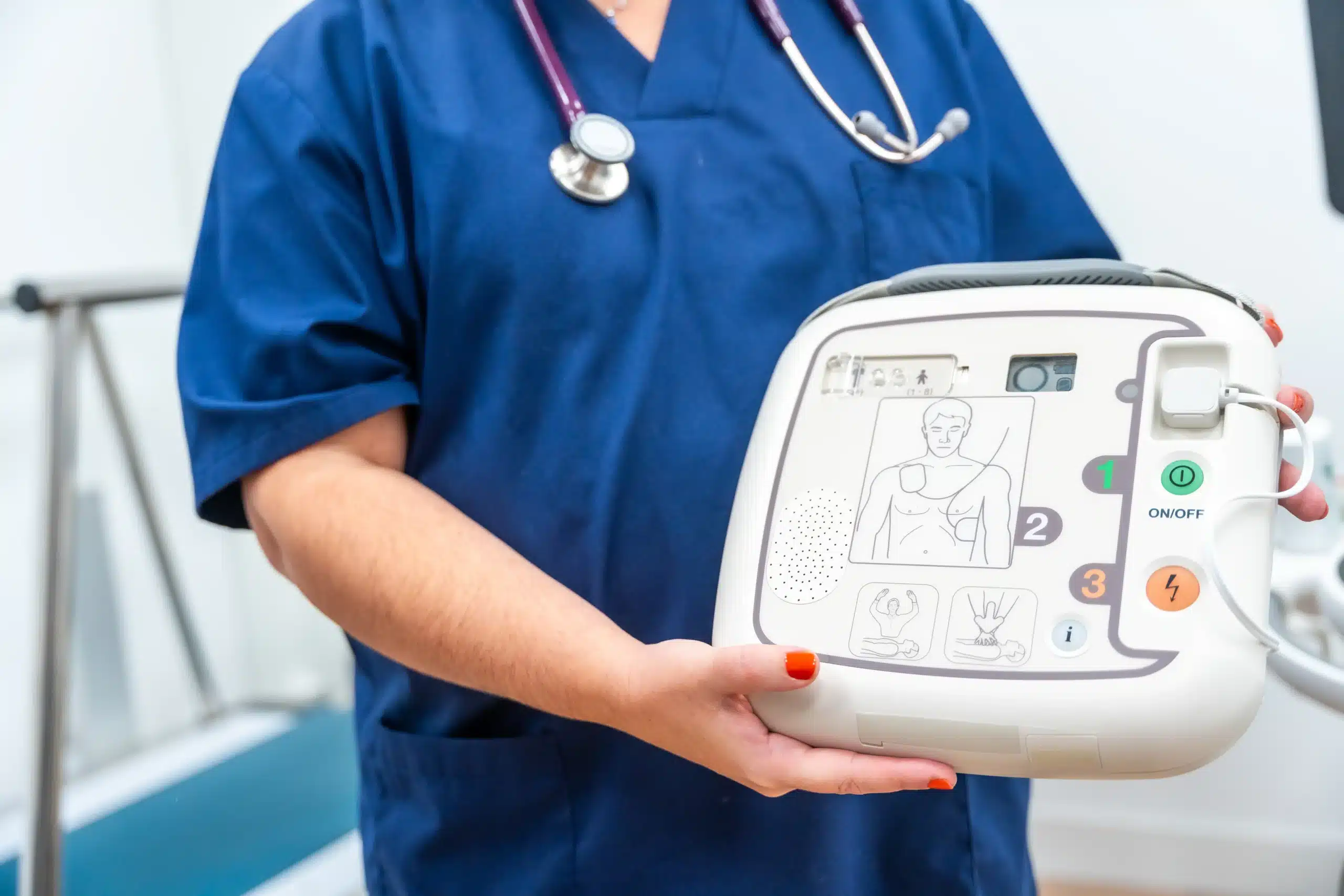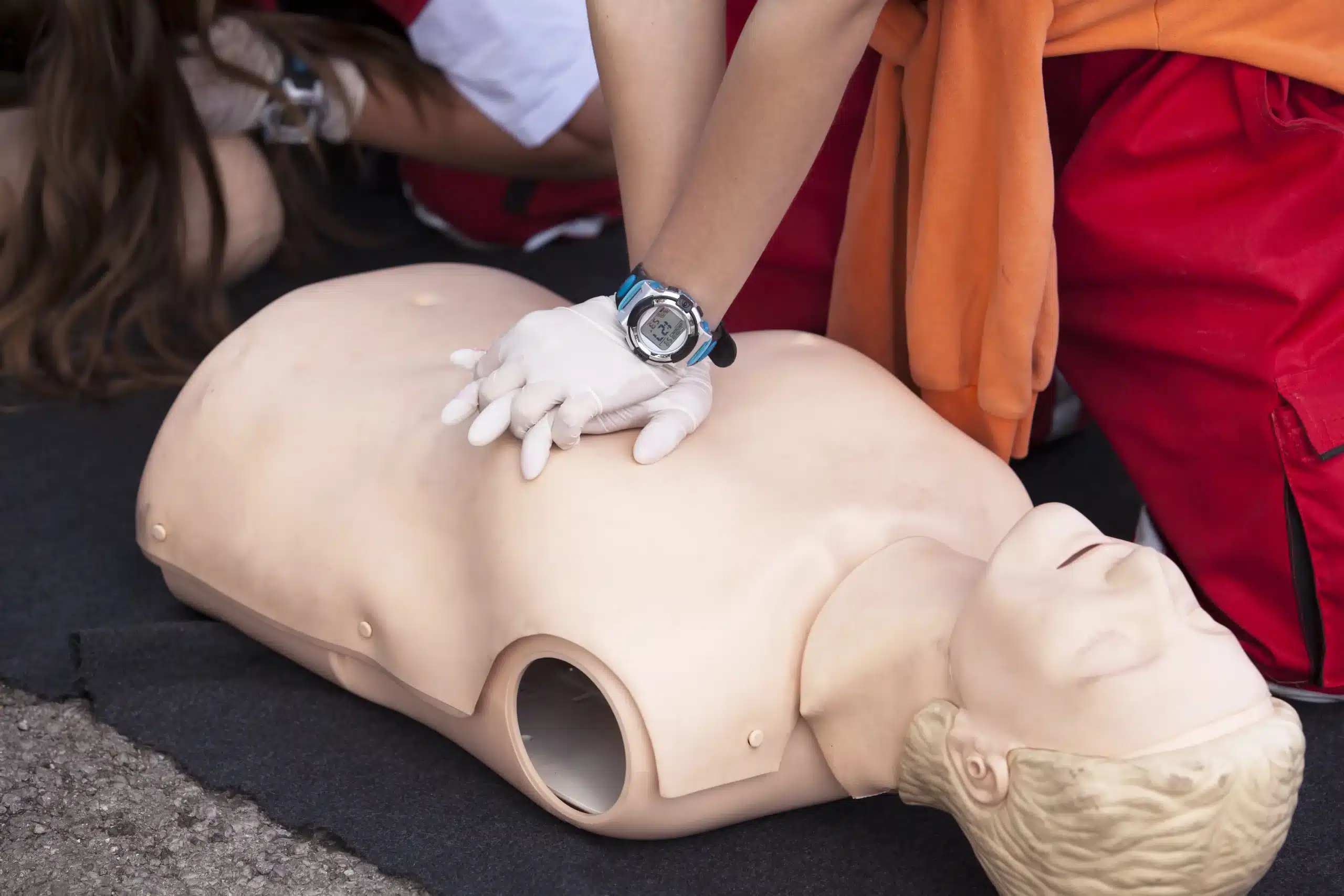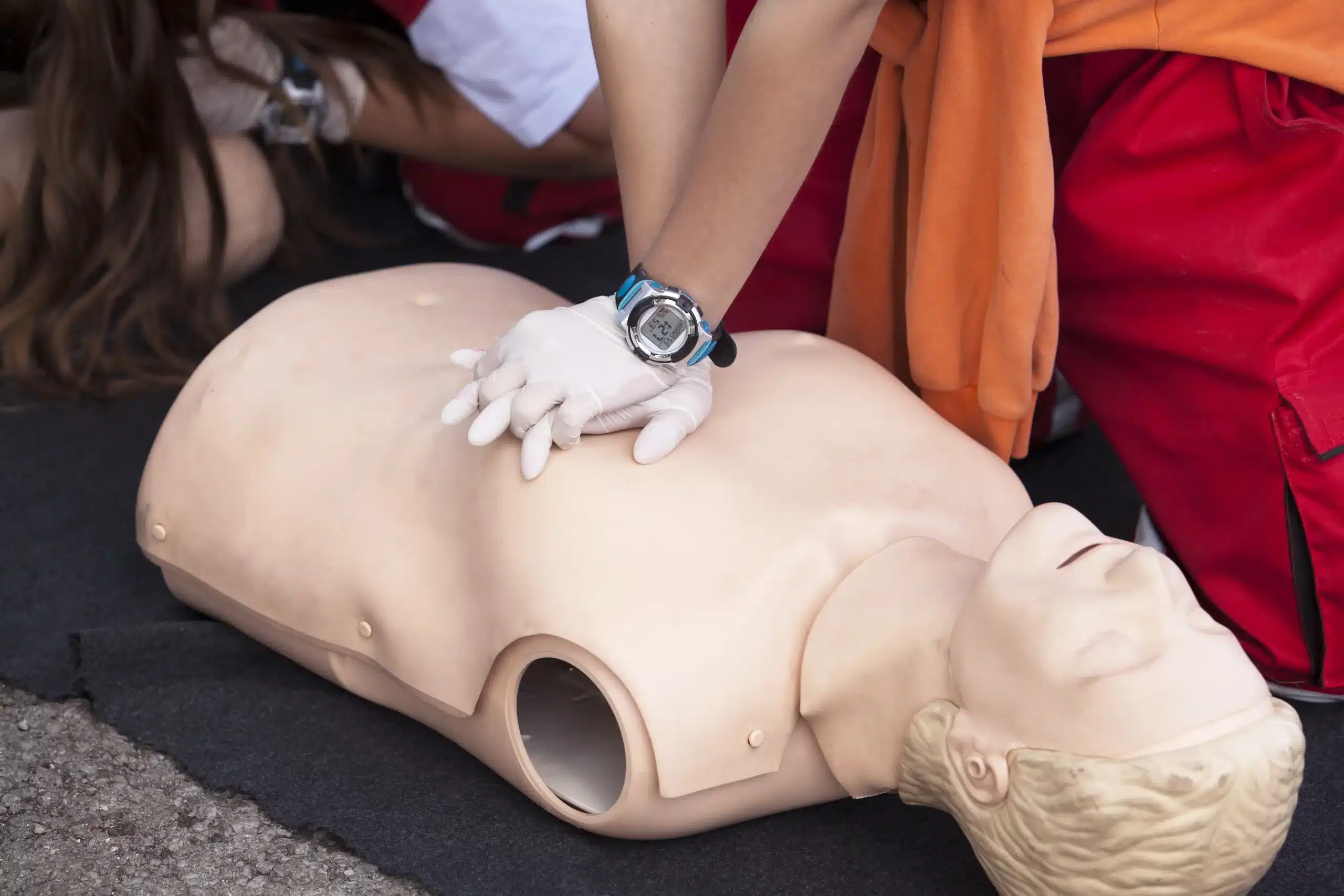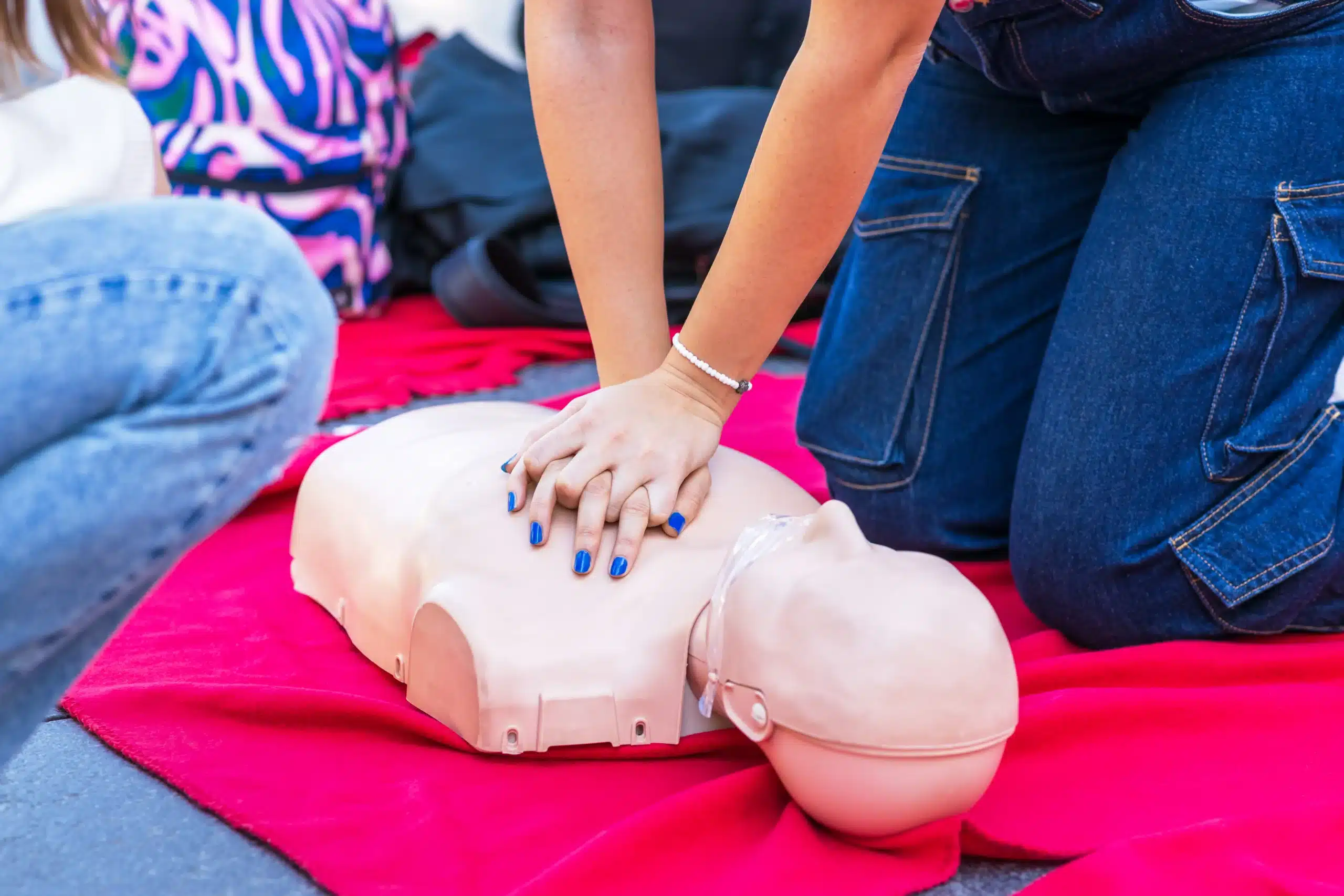Living in San Mateo means being part of a vibrant community that values the well-being of its children. As parents, caregivers, or simply concerned community members, we all share a responsibility to ensure their safety. Learning pediatric CPR and first-aid in San Mateo is a powerful way to contribute to that safety net. This article will delve into the importance of pediatric CPR and first aid, highlighting the specific skills you’ll learn, where to find training in San Mateo, the costs and available discounts, and how to keep your certification up-to-date. We’ll also address common misconceptions and answer frequently asked questions, making this your go-to resource for all things pediatric CPR and first aid.
Key Takeaways
- Pediatric CPR and first aid are crucial for child safety: Equipping yourself with these skills allows you to confidently handle emergencies like choking or cardiac arrest in infants and children, potentially saving a life.
- Choose a course that fits your needs: Look for training that aligns with any professional requirements, offers comprehensive content (covering infant, child, and ideally adult CPR and first aid), and accommodates your schedule and preferred learning style (online or in-person).
- Maintain your skills: CPR and first-aid certifications typically expire after two years. Stay prepared by renewing your certification promptly and consider ongoing education to keep your skills sharp and your knowledge up-to-date.
What is Pediatric CPR and First-Aid?
Pediatric CPR and first-aid are essential life-saving skills specifically designed for infants and children. Pediatric CPR involves chest compressions and rescue breaths to help restore blood circulation and breathing in a child who has stopped breathing or has a pulse-less heart rhythm. First-aid encompasses a broader range of skills to address various childhood injuries and illnesses, from minor cuts and scrapes to more serious situations like choking or allergic reactions. Learning these techniques empowers parents, caregivers, and anyone who works with children to respond effectively during emergencies. Take our Pediatric CPR and First-Aid certification course to learn these essential skills.
How It Differs from Adult CPR
While the basic principles of CPR remain consistent, crucial differences exist between adult and pediatric CPR. With adults, you can often begin with compression-only CPR. However, children experiencing cardiac arrest frequently require both compressions and rescue breaths because respiratory issues are a more common cause of arrest in children. The depth of compressions is also adjusted for a child’s smaller size—typically one-third the depth of the chest—and the rate of compressions may vary slightly. Understanding these distinctions is vital for providing safe and effective care to a child in need. The American Heart Association offers detailed guidelines outlining these differences.
Debunking Common Misconceptions
Several misconceptions about pediatric CPR and first-aid can prevent people from seeking training. Some worry about causing harm, while others hesitate to perform mouth-to-mouth resuscitation. It’s important to remember that any attempt at CPR is better than none. CPR and first-aid training teaches you the proper techniques to minimize the risk of injury and provides guidance on handling various emergency scenarios. Don’t let fear or misinformation hold you back from learning these potentially life-saving skills. Resources like Emergency First Response address common CPR myths and emphasize the importance of training. Contact us today to learn more about our CPR and first-aid certification courses.
Where to Find Pediatric CPR & First-Aid Training in San Mateo
Finding the right Pediatric CPR and First-Aid class can feel overwhelming, but several excellent resources are available in San Mateo. Here are a few options to explore:
Daly City CPR Classes
Daly City CPR Classes offers a range of American Heart Association (AHA) courses, including Pediatric CPR and First Aid. Known for their excellent customer service and commitment to affordability, they work to make these essential life-saving skills accessible to everyone. They also offer other certifications like BLS, ACLS, PALS, and more. Explore their CPR and First-Aid course options to learn more. Conveniently located in Daly City, they serve San Mateo, Millbrae, and the surrounding areas. For those needing specialized training, they also provide EMSA Child Care Health & Safety training and RQI programs. Daly City CPR Classes is committed to having the lowest prices in San Mateo County. Reach out to learn more.
Safety Training Seminars
Safety Training Seminars provides comprehensive training in Pediatric CPR and First Aid, along with other AHA courses such as BLS, ACLS, and PALS. They offer various class schedules throughout the week to accommodate busy schedules. Visit their website to find a class time that works for you.
San Mateo CPR & First Aid Classes
Offered by Safety Training Seminars, San Mateo CPR & First Aid classes focus on delivering high-quality training in Pediatric CPR and First Aid. As a woman-owned AHA Training Center, they understand the importance of emergency preparedness and empower students with the confidence to act quickly and effectively. Learn more on the Safety Training Seminars website.
College of San Mateo (Kinesiology 119)
For a more traditional academic setting, the College of San Mateo offers KINE 119 – First Aid and Adult & Pediatric CPR. This course provides structured learning and covers various first aid emergencies, including those specific to children. Review the College of San Mateo course catalog for details on registration and course schedules.
4Cs of San Mateo County
The 4Cs of San Mateo County offers specialized Pediatric CPR and First Aid training designed for childcare providers and parents. These courses build the skills necessary to respond to emergencies involving children and often fulfill required training hours for childcare professionals. Visit the 4Cs website for upcoming training dates and registration information.
What Happens in a Pediatric CPR & First-Aid Course?
This section covers what you can expect in a Pediatric CPR and First-Aid course, from the essential skills you’ll gain to the certification process. Understanding the course structure helps you prepare and choose the best class for your needs.
Essential Skills You’ll Learn
Pediatric CPR and First-Aid courses equip you with the skills to respond to emergencies involving infants and children. You’ll learn how to perform CPR on both age groups, a critical skill for parents, caregivers, and anyone working with children. The course also covers recognizing and responding to choking, a common and potentially life-threatening emergency. Additionally, you’ll learn first-aid techniques for common childhood injuries and illnesses, giving you the confidence to handle various situations. For a deeper look at pediatric first aid, check out our blog post on the topic.
Course Length and Structure
A typical Pediatric CPR and First-Aid course comprises about three units, combining lectures and homework. While the course provides a comprehensive understanding of pediatric emergencies, it’s not solely hands-on. This blended approach allows you to grasp the underlying principles before practicing the techniques. The College of San Mateo course catalog offers a good example of this structure. You’ll find a balance of theory and practical application.
Getting Certified
After successfully completing the course, you’ll receive an Adult and Pediatric First Aid/CPR/AED certificate, valid for two years. This certification demonstrates your competency in handling pediatric emergencies and is widely recognized.
Practice Makes Perfect
Experienced instructors, often EMTs, paramedics, or registered nurses, lead these courses. They bring real-world experience to the classroom, creating an engaging learning environment. Their interactive teaching style helps students practice and build confidence. You can learn more about instructor qualifications and experience.
Meet Your Instructors: Qualifications and Expertise
When your child’s safety is on the line, you want to know they’re in the most capable hands. At Daly City CPR Classes, our instructors bring extensive experience and specialized training to every course. We understand choosing the right CPR instructor is a big decision, so we want you to feel confident in the people teaching you these lifesaving skills.
Healthcare Experience
Our instructors have diverse backgrounds in healthcare, including EMTs, Registered Nurses, and Paramedics. This real-world experience translates into practical, hands-on training that goes beyond the textbook. They’ve encountered various medical emergencies firsthand, giving them valuable insights to share. This experience is particularly helpful when learning how to respond to high-pressure situations. Many of our instructors also offer in-home CPR training throughout San Mateo County, bringing their expertise directly to you. You can find additional information about CPR classes in San Mateo at San Mateo CPR Courses.
Recognized Certifications
Beyond their practical experience, our instructors hold nationally recognized certifications from the American Heart Association (AHA). This ensures they meet the highest standards for CPR and first-aid instruction. Becoming an AHA-certified instructor involves rigorous training, including instructor courses that cover effective teaching methodologies and student evaluation. Our instructors are also responsible for maintaining equipment, managing class records, and issuing certifications—demonstrating their commitment to a comprehensive learning experience.
Specialized Pediatric Training
Because children require a different approach to CPR and first aid than adults, we offer specialized pediatric CPR and first-aid training. Our instructors have specific training in pediatric care, equipping them to teach you the nuances of responding to emergencies involving infants and children. They’ll guide you through the specific techniques for different age groups, ensuring you’re prepared for any situation. Whether you’re a parent, grandparent, caregiver, or simply want to be prepared, our instructors will empower you with the skills and confidence to act quickly and effectively. We offer various CPR classes in Daly City, from basic CPR and first aid to advanced certifications like ACLS and PALS, catering to diverse needs and experience levels.
Course Costs and Discounts
Knowing the cost of training is a practical first step. We’re committed to making these lifesaving courses accessible, so let’s break down what you can expect.
Typical Prices
Basic Life Support (BLS) certification typically costs around $90. This covers the comprehensive training and materials you’ll need to become proficient in CPR. Prices can vary slightly based on the provider and specific course content. For the latest pricing information on CPR renewal in San Mateo, take a look at this helpful article.
Group Rates and Deals
We understand the needs of organizations training multiple staff members. That’s why we offer group discounts for businesses, schools, community groups, and others. Contact us to discuss flexible billing options and create a training plan that works for your team. Many providers offer similar group discounts, so it’s always worth asking.
Student and Military Discounts
We deeply value the contributions of students and military personnel. To show our appreciation, we offer special discounts for these groups. Check our website or contact us for details on how to apply these discounts.
Lowest Price Guarantees
We’re proud to offer the lowest prices for CPR certification in San Mateo County. Our commitment aligns with the Emergency Medical Services Authority (EMSA) requirements, ensuring our courses are both affordable and comprehensive. We cover all essential preventive health and safety practices, as detailed in our post on pediatric CPR and first-aid training. We’re confident in our pricing and offer a low-price guarantee.
Skills You’ll Master
This section details the essential skills you’ll gain in a pediatric CPR and first-aid course. These skills empower you to respond effectively to emergencies involving infants and children.
Infant and Child CPR Techniques
Infants and children have unique physiological differences from adults, requiring specific CPR techniques. You’ll learn how to assess an unresponsive infant or child, deliver age-appropriate chest compressions and rescue breaths, and perform CPR with one rescuer or as part of a team. Knowing how to perform infant CPR is crucial for parents, and ideally, it should be learned before or soon after the baby is born. Early CPR dramatically increases the chances of a successful resuscitation.
Choking and First Aid
Choking is a common hazard for young children. This training equips you with the skills to recognize choking signs in infants and children and perform appropriate first-aid techniques like back blows and chest thrusts to dislodge obstructions. You’ll also learn how to handle other common pediatric first-aid scenarios, such as minor cuts, burns, and allergic reactions. Our Pediatric CPR & First-Aid Training covers these essential skills.
AED Use and Emergency Response
Automated External Defibrillators (AEDs) can be life-saving in cases of sudden cardiac arrest. You’ll learn how to safely and effectively operate an AED on infants and children. The training also covers steps to take in various emergencies, including activating the emergency response system and communicating clearly with medical personnel. For healthcare professionals, the RQI program offers a streamlined path to BLS, ACLS, and PALS certification.
Find the Right Course
Finding the right pediatric CPR and first-aid course means considering a few key factors. It’s not just about learning the techniques; it’s about finding a program that fits your schedule, learning style, and specific needs.
What to Look For
First, confirm the course meets the requirements for your profession. For example, childcare providers in California need training aligned with the Emergency Medical Services Authority (EMSA) guidelines. These guidelines cover essential preventive health and safety practices for childcare settings. Look for courses that clearly state their EMSA compliance. Beyond compliance, consider the course content. Does it cover infant, child, and adult CPR? Does it include first-aid training for common childhood injuries and illnesses? A comprehensive course will give you a broader range of skills.
Online vs. In-Person
Next, think about how you learn best and your availability. Many organizations offer both in-person and blended learning CPR and first aid certification. Blended learning typically involves online coursework followed by an in-person skills session. This format offers flexibility, allowing you to complete the cognitive portion at your own pace before practicing hands-on skills with an instructor. In-person classes provide immediate feedback and interaction, which can be helpful for some. Weigh the pros and cons of each format to see what suits you.
Flexible Schedules
Life gets busy, so finding a course that works with your schedule is essential. Look for training centers with classes on various days and times. Daly City CPR Classes, for instance, offers courses seven days a week. Weekend or evening options can be especially helpful for those juggling work and family.
EMSA Childcare Compliance
If you’re getting pediatric CPR and first-aid training for childcare in California, EMSA compliance is crucial. Daly City CPR Classes offers compliant courses, ensuring you receive the right training to provide safe and effective care for children. Always verify a course’s EMSA compliance before signing up.
Keep Your Certification Current
Keeping your CPR and First Aid certification up-to-date is crucial for providing effective care in emergencies. Regular renewal ensures you’re equipped with the most current guidelines and techniques.
Renewal Requirements
CPR and First Aid certifications typically expire after two years. Check your certificate for the exact expiration date. The College of San Mateo offers renewal courses, highlighting the importance of staying current. This ensures you maintain your qualifications and remain prepared to respond effectively when needed. Don’t let your skills get rusty—stay proactive and renew your certification promptly. Contact us at Daly City CPR Classes to learn more about renewing your certification.
Continuing Education
Beyond renewing your certification, ongoing education in pediatric care is invaluable. The American Heart Association recommends incorporating age-appropriate CPR training into school curriculums. This benefits not only students but also reinforces the importance of continued learning for instructors and caregivers. Staying informed about the latest advancements and best practices ensures you’re always prepared to handle pediatric emergencies. For those interested in becoming a CPR instructor, a solid foundation in CPR and first aid, along with strong teaching skills, is essential. This emphasizes the value of not just maintaining your certification, but also developing your ability to effectively train others. Explore our RQI program to maintain and enhance your skills.
Why Pediatric CPR & First-Aid Matters
Knowing how to respond to a medical emergency involving a child can make all the difference. Pediatric CPR and First-Aid training equips you with the skills to act quickly and confidently, potentially saving a life. It’s not just about responding to major emergencies; it’s also about handling everyday situations like a scraped knee or a sudden fever with greater assurance.
Confidence in Emergencies
Imagine this: your child starts choking on a small toy. Panic sets in. Do you know what to do? For parents, especially new parents, pediatric first-aid and CPR training provides an essential foundation for handling such emergencies. Learning these skills instills confidence and preparedness, empowering you to act swiftly and effectively when every second counts. It’s not just about CPR; these courses also cover choking incidents and other crucial aspects of infant safety. Consider taking a class before your baby arrives or shortly after. But remember, it’s never too late to acquire these life-saving skills.
Community Safety
Learning pediatric CPR and First-Aid isn’t just a personal benefit; it strengthens your entire community. When more people are trained, the chances of a child surviving a cardiac arrest significantly increase. Think of it as a ripple effect: you learn these skills, then share that knowledge with family and friends, expanding the reach of life-saving techniques. The American Heart Association highlights the importance of teaching CPR to children, noting that they often become advocates, spreading this vital knowledge within their own circles. By taking a CPR and First Aid class in Daly City, you’re investing in your family’s safety and contributing to a more prepared and resilient community.
Pediatric CPR & First-Aid FAQs
Why is Pediatric CPR training important for parents?
Knowing pediatric CPR equips parents to handle breathing and choking emergencies. While learning is always beneficial, consider taking an infant CPR class before or soon after your baby’s arrival. This preparation offers invaluable peace of mind.
What is the success rate of early CPR?
Starting CPR within two minutes significantly increases the likelihood of successful resuscitation, reaching up to 85%. This highlights the critical role of immediate action. Learn more about the impact of early intervention on Boober.
At what age can children learn CPR?
The American Heart Association (AHA) states that children as young as four can begin learning basic life-saving skills. Their scientific statement emphasizes the advantages of introducing these techniques early.
What are common misconceptions about CPR?
Many people hesitate to learn CPR due to concerns about improper technique, potential injury, or mouth-to-mouth resuscitation. Emergency First Response addresses these and other common CPR misconceptions.
What resources are available for Pediatric CPR & First-Aid training in San Mateo?
Daly City CPR Classes provides comprehensive pediatric CPR and first-aid training for parents, caregivers, and childcare providers in San Mateo County. Our courses build the skills and confidence to manage emergencies. We also offer EMSA Child Care Health & Safety training. Learn more about our low price guarantee or contact us with any questions.
Related Articles
- Pediatric CPR & First-Aid Training in Daly City – Daly City CPR Classes
- Low-Cost CPR Certification in Daly City: Your Guide – Daly City CPR Classes
- CPR Training in Millbrae: Your Complete Guide – Daly City CPR Classes
- CPR Myths Busted: Learn the Truth About Saving Lives in Daly City
- Why CPR Is Crucial in Healthcare
Frequently Asked Questions
What if I’m nervous about performing CPR on a child?
It’s completely normal to feel apprehensive about performing CPR, especially on a child. Our instructors understand this and create a supportive learning environment where you can practice and build confidence. They’ll guide you through the steps, answer your questions, and help you feel prepared to act in an emergency. Remember, any attempt at CPR is better than none.
How often do I need to renew my CPR and first-aid certification?
CPR and first-aid certifications are typically valid for two years. It’s essential to renew your certification before it expires to stay up-to-date on the latest guidelines and maintain your skills. Contact us, or check with your certifying organization, for renewal options.
What if I have a busy schedule and can’t attend a traditional class?
We offer flexible scheduling options, including weekend and evening classes, to accommodate busy schedules. Blended learning courses, which combine online learning with in-person skills sessions, are also available, providing greater flexibility.
Is your Pediatric CPR and First-Aid training compliant with California’s EMSA requirements for childcare providers?
Yes, our training aligns with the Emergency Medical Services Authority (EMSA) guidelines for childcare providers in California. This ensures you receive the necessary training to meet state requirements and provide safe and effective care for children in your care.
What if I need to train a group of people, such as my staff or a community organization?
We offer group discounts and can work with you to create a customized training plan that meets your organization’s needs and budget. Contact us to discuss options and flexible billing arrangements.


